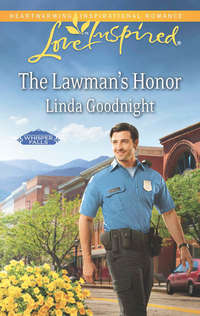
Полная версия
A Touch of Grace

“If my mother has something wrong with her heart, I need to know—whether she likes it or not,” Ian said.
“Worried?”
Sure he was worried. Worse than worried. “Mom has been my rock for a long time. Now I have to be hers.”
With the whisper-touch of her fingers, Gretchen stopped Ian’s nervous jiggling of his straw. “Would you like some company?”
Ian studied her sincere expression, a dozen conflicting emotions going off in his head. “Are you offering?”
“I am.”
He knew he should refuse, but he wanted her company. “I’d like that.”
Boy, was he in trouble. The woman had him in a tangle. He wanted to know her better.
And he wasn’t sure what to do about it.
LINDA GOODNIGHT
A romantic at heart, Linda Goodnight believes in the traditional values of family and home. Writing books enables her to share her certainty that, with faith and perseverance, love can last forever and happy endings really are possible.
A native of Oklahoma, Linda lives in the country with her husband, Gene, and Mugsy, an adorably obnoxious rat terrier. She and Gene have a blended family of six grown children. An elementary school teacher, she is also a licensed nurse. When time permits, Linda loves to read, watch football and rodeo, and indulge in chocolate. She also enjoys taking long, calorie-burning walks in the nearby woods. Readers can write to her at linda@lindagoodnight.com, or c/o Steeple Hill Books, 233 Broadway, Suite 1001, New York, NY 10279.
A Touch of Grace
Linda Goodnight

Is not this the kind of fasting I have chosen?…Is it not to share your food with the hungry and to provide the poor wanderer with shelter? When you see the naked to clothe him, and not to turn away from your own flesh and blood?…Then you will call and the Lord will answer, you will cry for help, and he will say: Here am I.
—Isaiah 58:6–7, 9
This book is dedicated to adoptive parents everywhere. You are God’s word in action.
Contents
Prologue
Chapter One
Chapter Two
Chapter Three
Chapter Four
Chapter Five
Chapter Six
Chapter Seven
Chapter Eight
Chapter Nine
Chapter Ten
Chapter Eleven
Chapter Twelve
Chapter Thirteen
Chapter Fourteen
Chapter Fifteen
Chapter Sixteen
Chapter Seventeen
Epilogue
Letter to Reader
Questions for Discussion
Prologue
Ian couldn’t stop shaking. He’d done something bad. Real bad. And now they were all in trouble.
Collin always said you shouldn’t tell nobody nothing. But he and his brothers had been cold. That’s why Drew made the fire, but Ian’s prekindergarten teacher didn’t understand. Her eyes got all watery and she took him to the school counselor. Ian hadn’t said nothing to Mr. James. He’d been too scared. But Ms. Smith told everything. Even stuff Ian didn’t say. Stuff about hi-jean and neglect and other words he didn’t know.
Now all three brothers were in the office. Him and Drew and Collin.
He looked across the cluttered room to where Collin stood with fists tight at his side. He hoped Collin wasn’t mad at him for telling.
Collin was ten, the big brother. He took care of Ian and Drew. Collin was brave. He didn’t even get scared when it thundered and rain slithered through the cracks of the trailer like wet snakes. He didn’t get scared neither when the cops came. He told them Mama was at the store and would be right back. But that wasn’t true. Sometimes Mama didn’t come back for days and days.
Drew leaped up from the plastic chair and charged for the door. “Leave me alone!”
Ian jumped at the sudden outburst.
“I’m not going this time. You can’t make me.”
Ian’s belly started to hurt. He sneaked a glance at Collin. Collin didn’t like it when Drew freaked out. That’s what Collin called it. Freakin’ out. Drew was mad, kicking and spitting and screaming. Bad stuff happened when Drew freaked out.
Sure enough, Mr. James grabbed his brother and pushed him into a chair. Mr. James was nice, but he was strong. With big muscles. And Drew was only seven.
“Settle down. Right now,” Mr. James said. “We’re trying to help.”
Drew struggled, growling like a mean tomcat. His too-long brown hair flopped wildly. He spit at Mr. James and said a bad word. Now he’d be in worse trouble. Drew never knew when to stop.
Ian couldn’t help it then. He started to cry. He clamped his lips tight and tried to stop, but he couldn’t. The sound stuck inside him, like peanut butter swallowed too fast. His chest hurt. He didn’t want the counselor to be mad at him, too. He didn’t want anyone to be mad. But he was scared and the tears pushed hard at the backs of his eyes.
His legs shook so much his hand-me-down tennis shoes nearly fell off.
He looked at Collin, afraid to talk for fear he’d say the wrong thing again. He needed to go the bathroom but wasn’t about to ask. What if the social worker took him away this time, and he never got to see Drew and Collin again? Mama said that would happen if they went around shooting off at the mouth.
He shouldn’t have told.
The tears ran through his nose and into the corners of his lips. He swiped at his face with the buttonless sleeve of his flannel shirt. This was all his fault.
Then Collin came over and put a hand on his head. Not a mad hand. A gentle, don’t-cry, hand. A quivery sigh ran through Ian. Collin would take care of him. He always did.
The social worker lady came over, too, and squatted down in front of his chair. She had nice eyes. And her voice was soft like Ms. Smith’s. But Collin didn’t like her. Ian could tell. Collin’s face was hard and mad, kind of scary.
“Don’t cry, Ian. I know you’re upset,” the lady said. “But you’re going to a real nice place that’s warm and has plenty to eat.”
Ian sniffed and looked at the woman. She smelled so nice. Much better than Mama. But he loved Mama. He wished she’d come home.
The social worker tapped the end of his shoe. The old stringless thing slipped off his heel. “We’ll get you some new tennis shoes, too. Ones that fit.”
Ian sucked in a hiccup. Shoes that fit. He’d like that. These were cold. The bottoms had holes and the inside was torn out. Sometimes they made sore places.
He wondered if he’d get some socks, too. White ones that came high up his leg and didn’t fall down when he walked.
He hoped they went back to the same foster house again. The lady there was soft and smiley and let him eat all the food he wanted. He didn’t know why Collin and Drew didn’t like foster houses.
“Collin.” The social worker looked up at his big brother. “You’re old enough to understand that this is for the best. You boys can’t continue living alone in that old trailer. Now, why don’t you help us get the little ones into the car?”
Collin didn’t even look at her. He stared at the wall like a superhero trying to look through to the other side.
Mr. James did a funny thing then. Keeping one hand on Drew’s shoulder, he got down on his knees in front of the chair and talked about baseball and God.
He said, “Boys, sometimes life throws a curveball. But remember, no matter what happens today or forever, Jesus will always be with you, watching over you.”
Collin must be a lot like Jesus. He always watched over Drew and Ian when Mama was gone. Well, even when Mama was home.
Then Mr. James bowed his head and started whispering. A prayer, Ian thought. The room got real quiet. Even Drew quit fighting.
When the prayer ended, Mr. James handed them each a little key chain with a metal fish on it. Collin wouldn’t take his.
“This is a gift from me to you, not as your counselor, but as a friend who cares.” He stared up at the social worker as if daring her to argue. She looked at the door and didn’t say a thing. “You don’t have to take it, Collin, but I hope you will. It’s a reminder that God will always care for you no matter where you go or what you do. He’ll never leave you. Never.”
Ian liked the sound of that. Jesus must be real nice.
Even though he stood stiff as a statue, Collin let Mr. James put the key chain in his hand. He wanted it. He was just too mad to say so. Then his voice scraped the air like rusty metal. “Where we going this time?”
The social worker lady stood up and moved toward him like she might touch him. Collin backed away.
“We’ve found placements for Drew and Ian.”
Ian’s heart slammed against his rib cage. What about Collin? He didn’t go anywhere without Collin.
“Together?” Collin asked.
“Not this time. I’m sorry.”
What was she saying? That he and his brothers wouldn’t be together? That he would be all by himself with a bunch of strange people? His legs started jerking again.
“They stay with me,” Collin said, but this time he sounded uncertain, as if maybe something bad was about to happen and he couldn’t fix it. “Ian gets scared at night.”
The lady touched Collin’s arm and her voice went soft and sweet. “He’ll be fine. They both will be. And so will you. Now, come on. We need to go.”
Turning, she held out her hand to Ian and smiled. He looked at Collin, saw the truth in his big brother’s eyes. This time Mama was right. Collin and Drew would go away and leave him. He would never see his brothers again. All because of his big fat mouth.
Chapter One
Twenty-three years later, New Orleans
“Dead!”
Head still foggy from a nightmarish sleep, Ian Carpenter pushed up on one elbow. He tried to shake himself awake enough to think straight. Someone had discovered a dead girl on the grounds of Isaiah House.
Heart jump-started by the horror of such a thing, he squinted one eye at the red digital alarm clock. Six-fifteen. After combing the streets of the French Quarter most of the night, he’d been in bed less than three hours. Whatever happened had gone down in that brief time.
Sometimes the futility of what he did was overwhelming.
Through a throat filled with gravel, he said, “I’ll be right down.”
In five minutes flat, he had showered and dressed in his usual jeans and T-shirt. He shoved on the new pair of Nike Shox he’d purchased yesterday, finding little joy in them now, and tiptoed down the squeaky wooden stairs of the old three-story mission house. Soon enough, the ten in-house residents would begin the day and he would be expected in the chapel with a word or to play the saxophone.
Ian both loved and hated his calling. He loved the people. He loved ministering and counseling. And he especially loved when someone’s life was turned around by the power of God’s love. But he hated times like these when the dark side won.
In the predawn September morning, he opened the back door out into the courtyard, a beautiful, lush green sanctuary where he often prayed and sought answers to the myriad problems of Isaiah House, the mission he’d started three years ago on faith and a few hundred dollars.
God had called him to this place of beauty and debauchery before Hurricane Katrina. Since the disaster, his work had more than tripled. Originally a small haven for runaways, Isaiah House now did whatever it could for any and everyone. True to the scripture that served as its cornerstone, the mission was a hand extended to whoever needed it. Sometimes that hand was stretched pretty thin.
This morning his courtyard sanctuary was hushed, the willows weeping condensation onto the cobblestone walkway as if mourning what lay just outside the mission walls. Beyond the dripping-wet elephant ears and lemon-scented magnolias, yellow police tape vibrated in the twilight stillness.
The stark contrast wasn’t lost on Ian. He’d worked the streets and slums of various cities all over the country since junior high school when Mom and Dad signed him up for summer missions’ work. Now, at twenty-eight, he’d come to understand all too well that beauty and tragedy coexisted everywhere. Sometimes he felt overwhelmed by his need to make a difference and the utter numbers of despairing mankind.
Ian leaned for a second against the rough bark of a moss-draped oak and squeezed his sleep-gritty eyes shut against the covered body lying on the ground.
Somebody had lost a loved one.
He hadn’t even heard the sirens. No surprise. They went on all night in this part of New Orleans. Sirens and reveling. And the desperate meanderings of runaways and drug addicts.
“Grace for today, Father,” he said simply. “To do Your work.”
And as always peace descended. He pushed off the giant oak, opened the lacy black iron gate and walked toward the buzzing hive of police activity inside the yellow tape.
“You the reverend?” an ebony-faced policeman, dressed in city blues, asked.
“Yes, I’m Ian Carpenter.” He had never been comfortable with the formalities of his profession. He was a street missionary, plain and simple. As his mama liked to say, “There but for the grace of God go you or I.” He was no better or more holy than anyone else. Reverend might fit some, but not him.
“What happened?”
“Looks like an overdose.” Even in the early morning, with the sun only peeking above the horizon, sweat beaded the officer’s forehead. Death was hard work for anyone. “You think she was comin’ to your place?”
“Possibly.”
“You mind having a look, see if you know her?”
Ian glanced toward the plastic-draped body. Unfortunately, in his line of work, this wouldn’t be a first. If she was a local, chances were pretty good that he’d at least seen her before. The street people were his love and his life. He made it a point to know them.
“Okay.” Though he dreaded what was to come, he fell in step with the officer and walked the few yards to the body.
With a respect Ian appreciated, the cop gently pulled the plastic away from a young woman’s deathly white face. Ian’s heart fell to his knees. A weight as heavy as the humidity over Lake Pontchartrain pressed against his lungs.
Maddy. Lost forever. So close to the help here in the mission that he and God longed to offer. Yet, she hadn’t made it.
Another failure for Ian.
He rubbed the back of his neck and blew out a weary sigh. He’d had the dream again last night. The nightmare where he was trapped in a dark place, filthy and cold and scared. For once, he hadn’t minded the phone yanking him from his bed. Not until he’d discovered the reason.
“Her name is Maddy,” he said quietly. “She stayed here for a couple of weeks.”
And for a while Ian had hoped she would heal. But no matter how much he’d prayed and counseled, one day she’d walked out, back to the addiction that had finally stolen her life. She’d once been beautiful, a curse on the streets, but a way to pay for the drugs. So young. And her big green eyes were always filled with confusion.
The officer jotted the information onto a tiny spiral notebook, then squinted up at him. “You know her last name?”
“No.” Most of the time, street people didn’t share identifying information and he accepted them as they came. “But she was a sweet kid. Gentle. Kind of innocent, if that makes sense. Innocent and lost.”
“Any kin you know of? Family she might have mentioned?”
Ian shook his head, feeling worse by the minute. He’d tried to minister to Maddy’s soul, but he didn’t know much about her former life. Every time he’d asked, she’d walked away. “I’ll ask around.”
Some of Isaiah House’s other residents might have known her better than he had.
A blue Channel Eleven News van careened to a stop along the edge of the street and a petite woman jumped out.
Ian groaned inwardly.
Just what he didn’t need this morning. Gretchen Barker, the Channel Eleven barracuda. An investigative reporter with a reputation as a watchdog for the public, Gretchen’s particular interest of late was religious groups. For the last year and a half she’d had her nose and camera in every New Orleans charity, making sure they toed the line.
Ian had no problem with that. He strongly believed that churches and charitable organizations should be held accountable for every donated penny. But he did have trouble with the woman’s attitude. Though he ran a squeaky-clean organization, Isaiah House had come under her scrutiny and her criticism a couple of times lately for the most mundane things.
She seemed especially interested in Ian’s finances, which was ludicrous to say the least. Every month Ian waited, partly in fear and partly in anticipation to see how God would keep Isaiah House afloat. As for his personal accounts, he wasn’t exactly stockpiling luxury cars and vacation houses. He lived in the mission and drove an old passenger van that needed an overhaul. His only indulgence was on his feet.
“We don’t need any reporters out here yet.” The officer eyed the van with similar distaste. “This poor girl may be dead but she deserves some respect.”
Ian had to agree. “I’ll go talk to them.”
By now, Barracuda Barker was standing at the yellow tape, straining toward the body on the ground as the police officer repositioned the plastic before carefully covering the victim’s face.
Before anyone could stop her, the reporter grabbed the tape and slid beneath.
“Whoa, lady.” Ian hurried toward her. The police had yet to finish their investigation and the forensic crew had only just arrived. “You can’t come past that tape.”
Face set, Gretchen Barker pushed by him. Ian caught her arm. “Did you hear me?”
The reporter’s head swiveled toward him. Beneath hair the color of gold, her face was pale. She yanked from his grip and started to run toward the still form on the ground. Ian caught her from behind, wrapping both arms around her waist. She kicked out, caught his left shin with the sharp heel of her sandal. Ian yelped, but held on. He’d never seen a reporter act so bizarre. She couldn’t want the story that badly.
He looked toward the photojournalist on the opposite side of the tape. The cameraman stood stock-still, staring at the scene, clearly shocked at the behavior of his colleague.
In that brief instant while Ian looked at the cameraman, the barracuda slammed an elbow into his lax gut. “Let me go. I need to see.”
Air whooshed out of him. He loosened his grip, but not before she whirled around and slammed the heel of her hand beneath his chin, knocking his teeth painfully together. Ian’s head popped backward. For a little woman, she packed a wallop.
What was her problem anyway? Was she so bent on getting her story that she had no respect for the dead? The idea curled Ian’s hair.
He caught her arm before she could slam him again. This time he stared fully into her face. What he saw gave him pause. Something was seriously wrong here.
Fear, not determination, dilated her pupils.
Ian relented a little. The death of someone so young was a hard thing to deal with—even for him.
Had she never reported a death scene before?
If that was her trouble, she deserved his understanding. Even though he choked a little to think of the barracuda and compassion in the same sentence, Ian tried one more time.
“Gretchen,” he said. “You know better than to break the police barrier. What’s wrong? How can I help? Haven’t you ever reported a death scene before?”
Her chest rose and fell. Her entire body trembled. Her mouth worked but nothing came out. And then, with an anguished cry that Ian would remember as long as he lived, she looked toward the body on the ground and said, “That’s my sister!”
Ian looked from the huge green eyes of the reporter to the covered body of the dead girl. Huge green eyes. They had the same eyes.
He had been breathless before, but now he couldn’t breathe at all. This strong, self-confident woman was a sister to fragile, helpless Maddy?
“Maddy. Maddy.” And then the woman he’d considered tough and hardened shattered before his eyes. She went to her knees on the thick, wet grass and sobbed brokenly. Ian followed her down, guilty for the negative thoughts he’d had about her, and gathered the shaking Gretchen to his chest.
“I’m sorry, so sorry,” he muttered against silky hair that smelled as fresh as the flowers in his garden.
Gretchen Barker, the barracuda whose news reports had teeth in them, felt small and soft and helpless in his arms. A protective urge, totally out of place given who she was, suffused Ian. For a man who kept women at arm’s length to protect the integrity of the mission, having a beautiful, grief-stricken woman in his embrace was not an everyday occurrence.
If he hadn’t been so saddened by the circumstances, Ian would have seen the humor in his predicament. He didn’t even like the thorn-in-the-flesh reporter and here he was thinking how pretty she was and how good her hair smelled. He was more than exhausted. He was losing his mind.
Reining in the wayward thoughts, he gently patted her back until the racking sobs subsided. Slowly, she pulled away, leaving damp spots on his green T-shirt. Her bereft expression tore at him.
“Could I call someone for you? A friend? Your family?”
“Maddy is my family.” Her face crumpled. She pressed shaking fingertips against her lips. “Oh, Maddy.”
Wanting to help, but not certain what to expect from a woman who’d kicked him, hit him and then collapsed in tears, he slipped his arm around her narrow shoulders. For a fraction of a second, she relented and leaned against his side. Then, she placed a hand on his shoulder and pushed up. The knees of her dark slacks were grass-stained and soaked with dew.
Crossing her arms as if they could shield her heart from the terrible sorrow, she said, “I have to see her.”
Ian understood. He didn’t like it, but he understood.
“I’ll ask the officer.”
Since she was next of kin, they had no problem securing permission. The police appreciated a positive ID.
Slowly, they walked toward the body. Ian had never in his life wanted so badly to comfort someone. She was shattered. She needed another human being to help her through this, but now that she’d gathered her composure and made up her mind to see her sister, she had pulled away from him, both emotionally and physically. She tolerated his presence, but not his comfort.
She knelt beside her sister’s body and waited for the policeman.
The officer’s dark, rough hand rustled the plastic. “Are you ready, ma’am?”
Shoulders stiff and resolute, she gave one curt nod.
When the still face was revealed, Gretchen didn’t react. She knelt there, staring down for the longest time. At last, when Ian wondered if perhaps there had been some mistake and this wasn’t her sister after all, she nodded.
“That’s Maddy.”
The policeman slid the cover back in place and moved quietly away, leaving them alone. Gretchen still didn’t move.
Another siren wailed in the distance. Across the street teenagers bounced a basketball while staring openly at the swarming police, trying to get a peek at the tragedy. Motors roared. Doors slammed. Voices carried on the morning air. Other news crews had arrived by now and were filming from outside the barrier.
Regardless of her occupation, Ian wanted to get Gretchen away from the reporters.
“Tell me what you need, Gretchen. What can I do?” Ian asked.
“Do?” she asked. “Do?”
She shot up from her knees, and that quick the barracuda returned. She turned on him, green eyes flashing fire. “I think you’ve done enough.”









